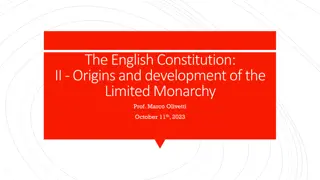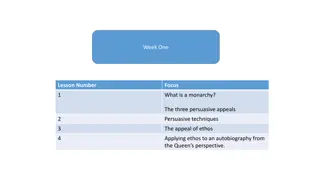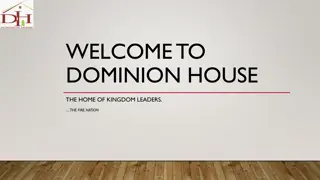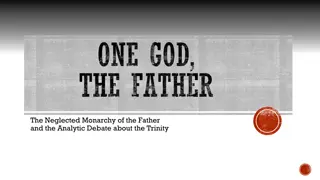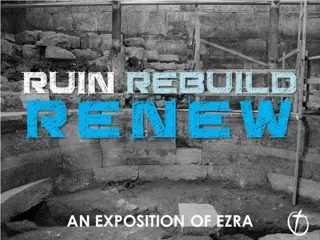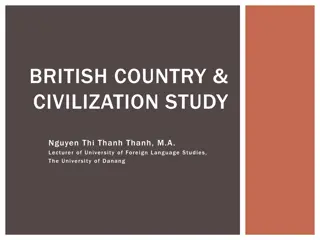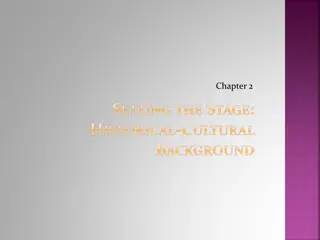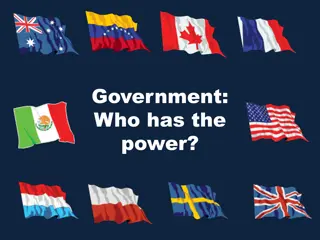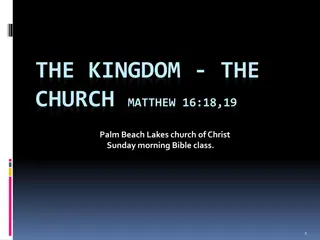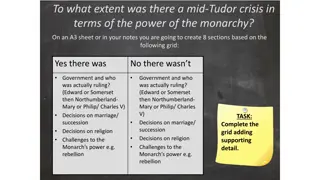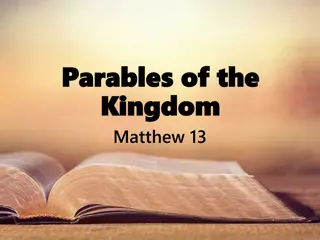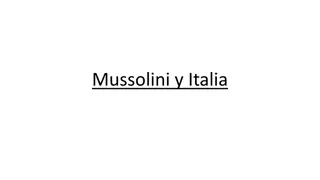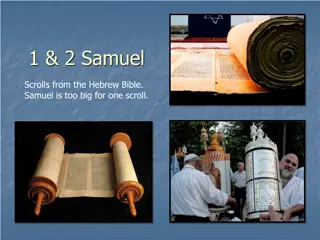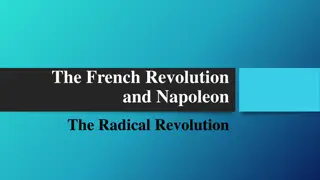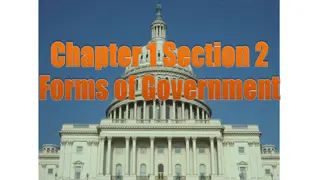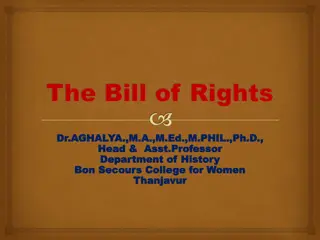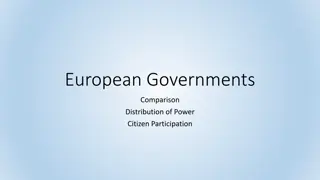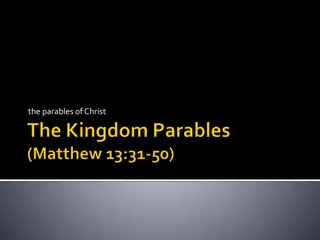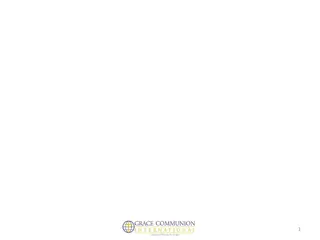The Government and Monarchy of the United Kingdom: A Historical Overview
Explore the rich history of the United Kingdom's government and monarchy, from the ancient institution of the Monarchy and the role of the Prime Minister to significant events like Magna Carta and the Civil War. Discover the development of Parliament, the birth of the Prime Minister, the roles of the Monarchy today, and the structure of the British government. Delve into the power, functions, and formation of the Parliament, and understand the significance of key figures like Oliver Cromwell in shaping the country's political landscape.
Download Presentation

Please find below an Image/Link to download the presentation.
The content on the website is provided AS IS for your information and personal use only. It may not be sold, licensed, or shared on other websites without obtaining consent from the author. Download presentation by click this link. If you encounter any issues during the download, it is possible that the publisher has removed the file from their server.
E N D
Presentation Transcript
The Society and Culture of Major English-Speaking Countries An Introduction (Book 1)
The United Kingdom of Great Britain and Northern Ireland Unit 3 The Government of the United Kingdom
Quiz Give the English and a brief explanation for the following:
Focal Points The Monarchy The development of the Parliament The birth of the Prime Minister and Cabinet The formation of the British government - The Constitution - The power and the functions of the Parliament - The role of the Monarchy today The two Houses in the Parliament
The Unit is Divided into Five Sections I. The Monarchy II. The Development of the Parliament III. The Birth of the Prime Minister and Cabinet IV. The Formation of the British government . The Two Houses in the Parliament
I. The Monarchy The Monarchy --the oldest institution of government The divine right of kings Magna Carta The civil war
Magna Carta Magna Carta is a medieval Latin name meaning Great Charter . In 1215, King John was forced by a group of feudal barons and the Church to grant them a charter of liberty and political rights .Magna Carta placed some limits on the king s ability to abuse his royal power.
The Civil War The Civil War was caused by a dispute over the power of the king against Parliament in the 17th century. The Roundheads led by Oliver Cromwell wanted to abolish the monarchy and to reassert the rights of Parliament, but royalists wanted the monarchy to go on. In 1642, the royalist armies were defeated and King Charles I was executed in 1649.
Oliver Cromwell Oliver Cromwell (1599- 1658) was an English military and political leader and later Lord Protector of the Commonwealth of England, Scotland and Ireland.
II. The Development of the Parliament The establishment of the Great Council by William the Conqueror ; The first use of the word parliament in 1236; The King or queen meeting regularly with some important MPs to ensure good relations with the Monarchy and Parliament.
III. The Birth of the Prime Minister and Cabinet The king or queen met regularly with a group of important Parliamentarians known as the Cabinet. King George I spoke English very badly and was not interested in politics, so he left the job of chairing cabinet meetings to one of his ministers. In time he came to be called the prime minister.
The Queen Meeting With the Members of the Cabinet Britain's Queen Elizabeth II, center, was accompanied by Britain's Prime Minister David Cameron, center back, as she was presented to members of the Cabinet at 10 Downing Street, London, Tuesday, Dec. 18, 2012.
Prime Minister David Cameron Prime Minister David Cameron holds a press conference at 10 Downing Street.
IV. The Formation of the British Government British government--- a parliamentary democracy and a constitutional monarchy The political parties The Constitution The power and functions of the Parliament The role of the Monarchy today
IV. The Formation of the British Government British government is a parliamentary democracy and a constitutional monarchy. Great Britain is the oldest Parliamentary democracy in the world , yet it has no written constitution.
Britain Is Both a Parliamentary Democracy and a Constitutional Monarchy The State Opening of Parliament marks the commencement of a session of the Parliament of the UK and includes a Speech from the Throne, known as the Queen's (or King's) Speech. The State Opening is an extremely elaborate ceremony showcasing British history, culture, and contemporary politics.
The Constitution Britain has no written constitution. The British constitution consists of statue law, common laws and conventions. British governance today is based on the terms and conditions of the Constitution.
The Power and the Functions of the Parliament Passing laws and voting for taxation; Scrutinizing government policies, administration and expenditure; Debating the major issues; Having the power to change the terms of the Constitution; Making or changing laws ; Passing any given legislation.
The Role of the Monarchy Today The symbol of the tradition and unity of the British State; Legally head of the executive and an integral part of the legislature; Head of the judiciary and commander in chief of the armed forces; The temporal head of the Church in England; Acting as a confidante to the Prime Minister
The Queen The Supreme Governor of the Church of England is a title held by the British monarch. Therefore, Queen Elizabeth II is now the Temporal Head of the Church in England.
V. The Two Houses in the Parliament The Palace of Westminster is the meeting place of the House of Commons and the House of Lords of the Parliament. The Palace lies on the Middlesex bank of the River Thames in the central London.
V. The Two Houses in the Parliament The House of Commons -consisting of about 650 Members of the Parliament elected by the people; -most MPs belonging to political parties; -not only receiving a salary of about 64766 but also having allowances for secretaries and researchers, travel and so on.
The House of Commons The House of Commons is a democratically elected body, consisting of 650 m embers who are known as Members of Parliament (MPs). They hold their seats until Parliament is dissolved (a maximum of five years after the preceding election).
The House of Lords The House of Lords: -consisting of the Lords Spiritual and the Lords Temporal; -not being elected and only representing themselves; -without salaries and many not attending parliament ; -sitting in the Lords either because they have inherited the seat from their forefathers or because they have been appointed by the Queen
The House of Lords The House of Lords is the second chamber of the UK Parliament. The Lords share the task of making and shaping laws and checking and challenging the work of the government.
Questions for Discussion A. How did the Parliament come into being and what functions does it have? B. What are the major characteristics of the British Constitution? C. What role does the Queen (King) and the Prime Minister play in the British Government? D. What kind of institution is the House of commons?
The End 2015 2015


